Fridge Or Foe: Foods That Should Never Be Left Chilling In The Refrigerator
Have you ever popped a loaf of bread into the refrigerator only to retrieve a slice a day or so later and find it hard enough to smash through a window? It’s one of those age-old battles we are all confused about and an adulting hack that has yet to be, well, hacked. What exactly am I supposed to put in the fridge, and what should go in the pantry? These are the questions we face on a daily basis. Sure, some obvious ones need to be chilled, like milk and meat products. But, there are some foods where the lines are blurred. So, let’s clear the confusion up once and for all. Here are 45 foods that you should never (we mean it, never) place in the fridge – even if your roommate’s cousin’s grandma has been doing it forever.
Eggs
Let’s kick off the most controversial one, shall we? Eggs – the cold-scale code of which is still to be cracked (pun intended). Since an egg is traditionally something you cook, and more importantly, an animal product that could go off in a certain amount of time, the natural assumption would be to keep your eggs chilled inside the refrigerator.

While studies show you should do this if you purchase your eggs already chilled inside the store refrigerator, it is, in fact, totally possible and even advised to keep fresh eggs (not bought cold) at room temperature. Just be sure to keep them in your pantry and out of the sun!
Avocados
We know this one shocked us too. We’ve all fallen victim to the multiple personalities of the avocado – either completely unripe or perfectly soft on the outside with a rock-hard milky core. Or, the worst by far, completely bruised and tarnished due to one-too-many supermarket finger pokes.

While we can’t stop avocados from playing their mind games, we can make sure we’re storing them properly. Rather their fault than ours, right? Pop them on the counter, and eat them as soon as they’re ripe – placing avos in the fridge only makes them more stubborn.
Butter
Want to hack away at the final piece of your ultimate pancake puzzle for an hour before ungracefully plopping it alongside the stream of melted syrup? If you do, great, then you should refrigerate your butter. But, if you’re a normal person, then keep reading.
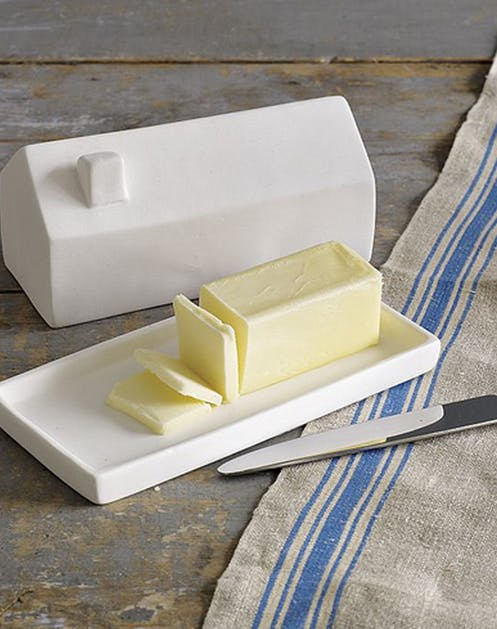
While a morning workout is great for productivity, tirelessly using a spoon to chisel butter for your breakfast does not count. If you prefer it to slide right onto your toast, keep it out of the cold. Just don’t put it in the sun – then you’ll need that spoon for a whole other reason.
Honey
Honeycomb is something I think we can all agree is lip-smackingly good. But, that doesn’t necessarily mean we want honeycomb every time we reach for the honey. Sometimes, you just want honey. Keep your golden liquid, well, liquid, by keeping it at room temperature.

The minute you place your honey in the refrigerator, it becomes a never-ending battle. We’re talking torn toast, crystalized chunks on top of yogurt, and unappetizing splashes of sweet rocks into herbal tea. Keep honey’s integrity by leaving it silky smooth and far away from the cold.
Ketchup
Condiments are perhaps one of the most confusing faux-fridge foods. We all use them, and we all have different (preferred) ways of storing them once opened. If you’re someone who swears by placing your ketchup in the fridge, you may find yourself gasping in shock at someone who simply pops theirs back in the pantry.

We wish we could give you a definitive answer on who’s right and wrong in this debate. However, there is no right or wrong way to store ketchup. Putting it in the fridge won’t hurt it, but those who keep it at room temperature do say it tastes better, which is reason enough for us to keep it out of the cold.
Bananas
Much like our frenemy, the avocado, bananas are temperamental fruit. They either stay green for forever and a day or become bruised mush overnight! We don’t know the exact way to become banana whisperers, but we do know that placing them in the refrigerator is not (always) the answer.

If they’re fast-tracking their way to rot town, then putting them in the comfort of the cold fridge could slow down the process. Just keep them away from other impressionable fruit and veg – they emit a nasty gas that ripens everything in their wake.
Eggplant
The banana’s arch-nemesis, the eggplant, holds many of the same principles as the aforementioned fruit, even though it’s one of the most affected victims of the banana-ripening gas. As such, it’s best to keep eggplants that you plan on eating soon in a space at room temperature.

The cold air from the fridge will just slow down the speed at which the eggplant ripens, keeping it as firm as a tennis ball. And, you’ll have to wait that much longer to whip up your favorite parmigiana di melanzane – mamma mia!
Cucumber
Have you ever opened your refrigerator to find a semi-frozen, while somehow simultaneously limp, sad-looking cucumber? It’s unsurprising given that cucumbers are almost 90% water, and what happens to water when it becomes super cold? It freezes. We don’t need a rocket scientist to figure that out, though!

Not only could the fridge ruin the taste and texture, but cucumbers are actually completely fine being left to their own devices. Best to just keep them in your fruit bowl (away from those gassy bananas) and enjoy the refreshing crunch of how they should really taste.
Cereal
It may be common practice to assume that placing something in the refrigerator will keep it nice and fresh. But, with cereal, believe it or not, popping your box of Cheerios into the cold air will actually have the opposite effect.

Keeping your cereal chilled will make it go stale and develop a very cardboard-like taste. If you’re worried about bugs or other pesky snackers getting into your stash, just pour them out in a re-sealable container – problem solved, crunch saved!
Opened cans
And here’s one that could turn into a life or death situation (kidding, kind of). Opened cans, aside from making your whole fridge smell and leaving a metal aftertaste on your remaining garbanzo beans, can also be a poisonous health hazard.

Once an open can has a short stint in the refrigerator, fresh air causes all the bad science stuff to happen – releasing a harmful chemical into the food within the can. But fear not! You don’t have to chuck out your leftovers. Just pop them in a Tupperware, and you’re good to go.
Donuts
Ignoring the fact that you deserve a medal for not eating all your donuts in one sitting, you would also need an industrial-sized fridge to keep that box of a dozen comfortably on a shelf. Unless you’ve opted for less, of course, in this case, we can’t relate.

If you are a self-restraint ninja, then you’re better off keeping them out of the cold. Pop them on the kitchen counter or in the pantry, where they’re less likely to go stale. Just be sure to eat them within two days! Challenge accepted.
Alternative milks
Oat, almond, soy, coconut milk, and the like are extremely popular and show no signs of slowing down. Given their newness, however, you’d be forgiven for placing the carton directly in the fridge once you purchase a brand new one.

But, unlike cow’s milk which is an animal product and should always be kept in the fridge, alternative milk is just fine being held in the pantry until opened. But, if you’re keen on an immediate iced latte, there’s also no harm in chilling it in the fridge.
Fresh herbs
Ever put your newly picked (or purchased, no judgment) basil or mint in the fridge, only to grab it later that day to add to a salad or sprinkle over pasta and find it damp, dried out, or semi-frozen? Us too.

They’re also impressionable little things and will soak up the scents of surrounding items in the fridge. And, no one wants cheese-flavored thyme, right? It’s best to keep them in an airtight Tupperware container or plant your own – ready for the picking whenever the mood strikes!
Corn
Can’t say we’ve ever seen a corn on the cob chilling in the fridge (pun intended), so if you’re someone who chucks yours in alongside the yogurt and milk, may we just ask, why?! While we can only imagine you have your reasons, allow us to debunk them all.
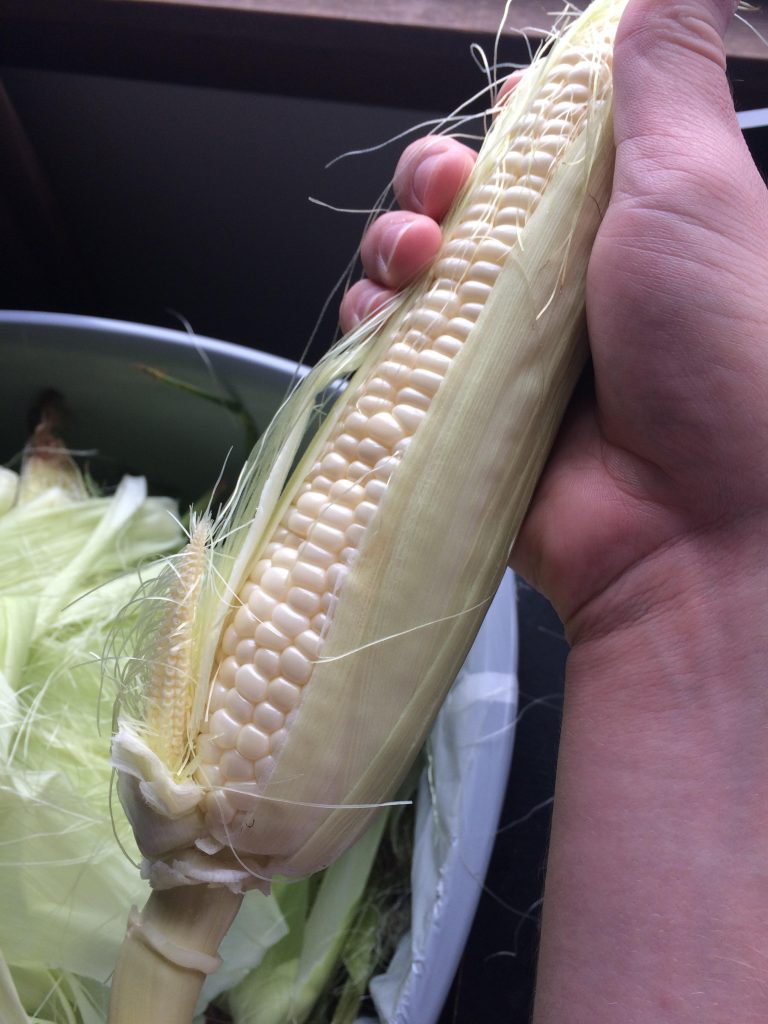
Not only is corn not considered a traditional vegetable and therefore does not need to be kept fresh – but putting it in the refrigerator has also been proven to make it lose its crunch and sweetness, which are the very reasons we love corn to begin with!
Jam
This is most certainly another one of those confusing cases – or as we like to say, to fridge or not to fridge? While putting your jam in the refrigerator won’t have a negative effect per se, and some prefer it due to the chill factor, there’s also no harm in keeping it out of the cold.

The high sugar content of jam acts as one of Mother Nature’s top preservatives, meaning no nasty mold or the like will dare to inhabit it – even when left out of the refrigerator. The good news is, in this case, you’re right either way!
Spices
While we’re not sure why you’d choose to put your paprika in the refrigerator, it appears you found this list for a reason. And so, to honor our duty to you, we’ll give you a quick debrief as to why putting your spices in the fridge is a big no-no.

For starters, say goodbye to aesthetic dustings of cinnamon on your oatmeal because refrigerated spices will undoubtedly clump together once chilled. It’ll also lose a ton of its flavor, which goes against the whole point of spice, doesn’t it?
Bread
We’ll admit, we’ve fallen victim to the bread confusion once or twice ourselves. It’s a natural instinct to try and save something that a) you love and b) molds faster than you can say “grilled cheese,” to do whatever you can to keep it fresh.

But alas, try as we may, when bread wants to go stale – it goes stale. Putting it in the fridge will only make it cold and stiff, so unless you plan on eating it solely as toast for the foreseeable future, don’t refrigerate your loaf.
Tomatoes
There’s nothing better than a juicy tomato fresh from the picking or popping a wonderfully sweet cherry lookalike on top of your salad for that little something extra. Love ‘em or hate ‘em, we can all agree that tomatoes are only good when they’re ripe and ready for eating.

Placing them in the refrigerator will not only slow down the ripening process of unripe tomatoes but will also completely strip them of their flavor over time. And no one wants a pale, mealy tomato. Just pop them in the light on your windowsill and let them do their thing.
Berries
Okay, we’ll admit, this one surprised us, too. But before you throw your laptop out the window, let us explain. Refrigerating your berries won’t necessarily have any adverse effects, but it could cause them to become mushy and lose their plumpness if locked out of air.

On the other hand, the only time you shouldn’t keep your berries in the fridge is if you’re planning on eating them ASAP or within the next day or so. But, any fan of a lip-smacking strawberry, blueberry, or raspberry should have no problem with that.
Mustard
It’s almost second nature to place anything with an open-close lid in the fridge. We get it. Luckily, mustard has its own back, so we don’t have to worry about leaving it out on the table or kitchen counter overnight following a burger party.

Much like ketchup, the high acid volume in mustard is what keeps it from going off, so placing it in the pantry will do it just as good as leaving it in the fridge (whatever temperature you prefer, of course).
Salad dressing
Most, if not all, vinaigrette-based salad dressings are made of easily separated ingredients – which is why we give the bottle a good shake before dousing our Waldorf with its contents. Putting your salad dressing in the refrigerator will only separate these ingredients more.
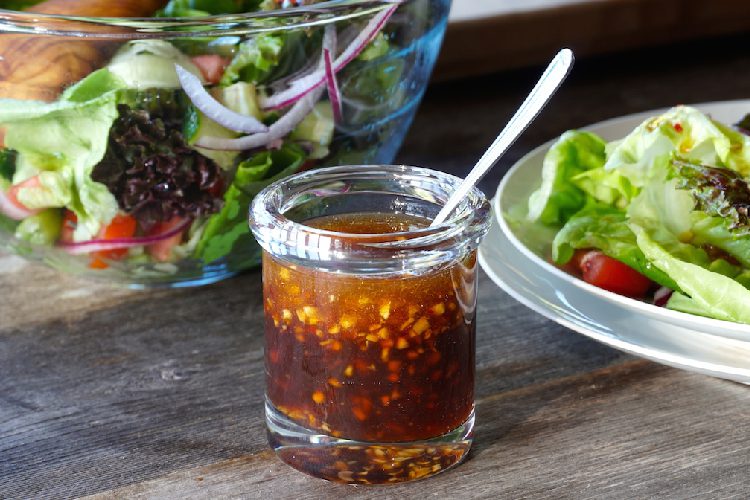
But, the world of salad dressings is not so black and white, so keep your wits about you. Any dairy-based dressings like blue cheese, caesar, or ranch must be refrigerated much like other dairy or cream-based products. Trust us on this one.
Pickles
The hint is kind of in the name for this one, but we’ll go ahead and elaborate. The natural salts and preservatives that come from the pickling process are enough to keep your pickle in tip-top shape without having to keep it chilled in the refrigerator.

But just because they’re pickled doesn’t mean they’re invincible. Make sure your pickle lid is on tight to keep all the flavor and crunch in, and if you bought them cold from the store, then keep them cold at home.
Peanut butter
Spreads such as peanut butter are meant to be, well, spread. Refrigerating your peanut butter is not only unnecessary but will also completely ruin the silky-smooth texture of what is quite possibly the best foodstuff in the world. (Sorry to those with nut allergies).

And while some may think natural peanut butter, given the lack of preservatives and sugar, will go bad if not refrigerated – we have a sneaky tip. Just keep it upside down in your pantry! This helps the natural oils distribute equally throughout the jar for that velvet smear.
Olive oil
You know when you buy coconut oil, and it’s so solid that you have to leave it in the sun for an hour just to be able to use it? Well, putting your olive oil in the refrigerator won’t entirely be as bad as that, but it won’t end very well either.

Aside from the fact that it could solidify, change texture and color, and worst of all, lose its distinctive taste, putting your olive oil in the refrigerator goes against every Mediterranean olive connoisseur who introduced it to us in the first place.
Melon
Now, this only goes for uncut and unopened melons, but keeping it out of the refrigerator could just change your melon snacking game forever. It’s been scientifically proven that all melons thrive in ambient temperatures and taste like their best sweetest selves when kept out of the cold.

If you’d prefer not to eat an entire watermelon or honeydew in one sitting, then fret not. Simply pop the leftover slices in an airtight container or some plastic wrap and enjoy the same sumptuously sweet snack over the next few days.
Coffee
It’s pretty standard practice for people to put their coffee beans or coffee grounds in the fridge, but we’re here to debunk the myth. Turns out, putting your coffee in the refrigerator will not actually enhance the flavor but will rather completely eliminate it.

We can’t imagine anything worse than reaching in for your fresh bag of ground beans, ready to kickstart your morning with a homebrewed cup, only to find it tastes like a mixture of dirt and water. Rather, keep your beans in the pantry. They’re the happiest there.
Onion
You can probably guess from the get-go why refrigerating your onions is a bad idea. Aside from the armpit-esque fragrance that will no doubt seep into your favorite batch of cookie dough, placing your onions in the fridge will turn them, quite literally, into a pile of moldy mush.

Sorry for the visual, but there’s no other way to put it. Onions don’t do well in humid environments, and the wet air from the refrigerator won’t help. Just keep them at room temperature or on your shaded vegetable rack, and you’ll be good to go.
Aged cheese
Note the important differentiating factor here, “aged.” Most cheeses need to be refrigerated to keep them fresh, but the cheese that has, well, done the work of aging most definitely does not need to be kept chilled, which will ruin all of its work.

Aged cheese has specifically been curated through a timeous process for months just so that it can be kept out of the fridge and retain its unique flavor on its own. Plus, refrigerating your aged cheese (which is naturally hard) will only make it that much harder to slice.
Potatoes
Mash, wedges, baked, fried, and all the other fantastic food items our friends the potatoes give us once cooked should always be kept cool in the fridge. Otherwise, they’ll go off within hours, and you’ll have to chuck out your lovely leftovers. Fresh potatoes, though? They’re another story.

Fresh potatoes are packed with starch that, once refrigerated, basically just says nope. The cold air makes the starch turn to sugar – so unless you want an unintentional sweet potato with a terrible texture, we recommend keeping them in a cool, dark space where they can thrive in peace.
Chocolate-hazelnut spread
Much like its other spread friends – butter, jam, and peanut butter – chocolate-hazelnut spreads such as Nutella and the like (is your mouth watering yet?) need not be kept chilled in the refrigerator. In fact, it shouldn’t be chilled at all.

Unless you have the arm strength of a gladiator, it’s best to keep your chocolate hazelnut spreads out of the cold and in the comfort of your room-temperature pantry where it can be easily transferred onto toast, pancakes, or a spoon (we don’t judge).
Vinegar
Splashing some white vinegar on top of your fish and chips, dressing your salads with balsamic, and even using apple cider vinegar for a homemade face cleanser are just a few reasons to love the nose-burning condiment. Want one more? It can last for ages on its own!

Vinegar is a natural preservative that’s often used to keep other foods from going bad when they’re kept out of the fridge – therefore, it’s no surprise that the refrigerator is the last place that vinegar needs to be. Just pop it in the pantry, and your work is done.
Stone fruit
There’s nothing better than a juicy plum or sweet nectarine for that perfectly fresh pick-me-up snack. Stone fruit often takes forever to get to that perfect, succulent texture, and refrigerating them will only stop the ripening process in its tracks.
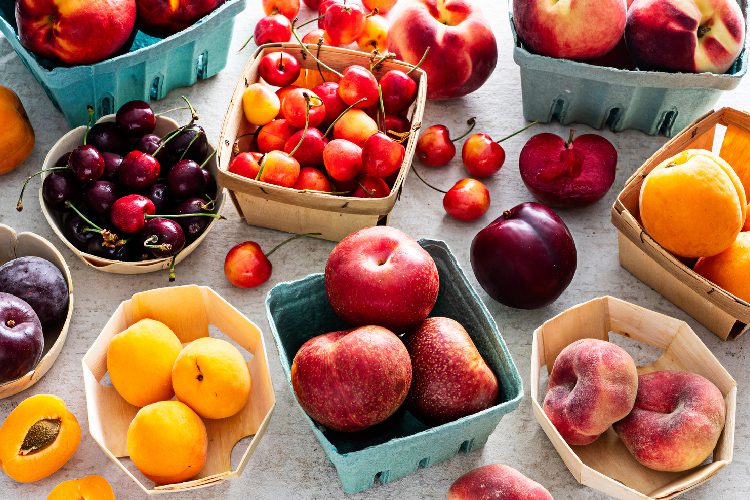
Stone fruits thrive outside of the cold, so placing them alongside your milk in the cold of the fridge can turn them pale, gritty, and tasteless. Instead, just keep them on your counter with the unripe avos. After all, fruit bowls were invented for a reason!
Dried fruit & nuts
If there’s any foodstuff that has absolutely no business being kept in the refrigerator, it’s undoubtedly dried fruits and nuts. We’re sure you don’t need an explanation as to why, but just in case you do, we’re here to help.

Let’s start with dried fruit, shall we? The natural drying and preserving process it has gone through means it doesn’t need to be kept chilled for freshness. The same goes for nuts, which will just turn stale and bland after spending too long in the cold.
Butternut & pumpkins
Here’s another confusing one, we’ll admit! The best thing to do with your butternuts and pumpkins is actually, you guessed it, to keep them in your pantry or fruit (now slowly becoming veggie) bowl on your kitchen counter. There’s no need to shove them awkwardly in the fridge, thank goodness.

The thick skin around pumpkins and butternuts keeps them from turning rancid, even after you slice them open. We’d only suggest keeping completely skinless pieces in the fridge if you have cubed them up to use on a later date.
Hot sauce
We couldn’t think of a more unpleasant environment to call our home if we were bacteria (stay with us) than a flaming bottle of spicy liquid. As such, it’s hardly a surprise that hot sauce can last just fine on its own without being refrigerated.

There is one benefit of keeping your hot sauce in the fridge, however. If you don’t have the stomach to go through a bottle every two weeks (we don’t blame you), then you can ensure a longer-lasting flavor and freshness by stacking it in the refrigerator. The choice is yours with this one!
Rice
Now it’s important to note we’re not talking about cooked rice here, as cooked rice needs to be refrigerated and eaten within a day or two before it goes all odd and binds together. Dried rice, however, is a completely different ballgame.

It’s been around for centuries, long before the invention of the refrigerator, and has lasted just fine being kept in a sealed container (or silo, in those days). As long as you make sure any kind of moisture can’t get to it, you can store your rice wherever you like.
Baked goods
Much like the not-so-nice effect that keeping your bread in the fridge will have on its texture, refrigerating your baked goods such as cookies and cakes will only cause them to go stiff and stale—an utter travesty, in our opinion.

Instead, just pop them in an airtight Tupperware and keep them in the shade of your kitchen counter or pantry. Even better, hide them right in the back out of the prying eyes of friends and loved ones – they’ll taste better, and there’ll be more for you!
Soy sauce
Given that soy sauce is very high in sodium (or extremely salty, if we’re not being scientific), it doesn’t need to be refrigerated to keep it fresh, as sodium is a natural preservative. Hence why you never see your favorite sushi restaurant grab it from the fridge upon presenting you with your platter.

Much like some of the other condiments mentioned in this article, soy sauce will do just fine on its own without being chilled. As long as you keep your soy sauce out of the sun, like in the shade of the pantry, you’re good to go.
Citrus fruits
Given that many fruits grow in warm, outdoor climates, it’s no surprise that they don’t need to be kept in the refrigerator for longevity – and citrus fruits, such as lemons, oranges, clementines, and grapefruit – are no different.

The peel will keep them fresh once picked for a week or so, and keeping them in a fruit bowl will do the job just fine. However, if you prefer to precut your fruit, just pop the pieces in an airtight container and keep them in the fridge for longer-lasting freshness.
Peppers
Much like their friend, the fruit, vegetables also have a tendency to stay fresh long before they need to be refrigerated. This is due to a combination of the way they’ve grown and their sturdy exterior (tough guys, those veggies). Especially peppers…
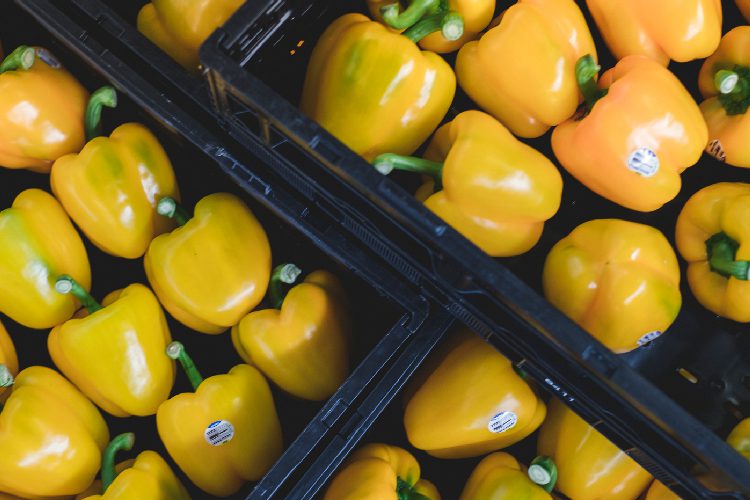
Peppers can last for a decent while before you even need to slice them up for consumption. The pantry or fruit/ vegetable bowl on your kitchen counter (which is probably getting pretty full at this point) is the perfect home for peppers until they’re cut (after which you’ll need to keep them chilled).
Apples
Apples are, in our opinion, what fruit bowls were designed for. Therefore, it makes no sense to go against the grain and store your apples in the refrigerator. As we’re sure you know by now, apples can be temperamental, going soft or getting bruised before you can say “apple pie.”

Unfortunately, keeping them in the fridge won’t stop them from being temperamental – you’ll just have to make sure you buy a good batch from the market and eat them before they go bad (shouldn’t be a problem when they look like these juicy ones, right?)
Chocolate
Unless you live in the Sahara Desert and have no access to a cool, dry storage space, your chocolate should never be kept in the refrigerator. Here’s why. Not only could the taste be ruined, but the texture could go completely whack as well.

Cold temperatures cause chocolate to lose its distinct (heavenly) taste that we know and love, as well as having a negative effect on the sugar content within the sweet treat – causing the silky smooth, decadent texture to turn into something emanating a bar of soap. No thanks!
Garlic
Aside from the fact that much like its pal, the onion, garlic will undoubtedly stink out your entire refrigerator once the bulb is opened. It could also go moldy at the snap of a finger (or slam of the fridge door) if exposed to moisture and cold temperatures.

It’s best to keep your garlic in the, you guessed it, pantry, where it can live happily for weeks (sometimes even months) on end before going bad. This only applies to unopened garlic, though, as once you grab a bulb, you’ll need to finish the lot within two weeks.
Carrots
If you have a particular desire for a cool carrot, we’re pleased to announce that chilling them in the refrigerator for a couple of hours will do no harm. If you’re planning on storing them there full time, though, you will have a problem on your hands—a rotten problem.

Because carrots are primarily water-based, the cold in the fridge will just make them mushy and limp as opposed to keeping them sweet and crunchy. Just keep the storks attached and place them with your cucumbers and corn! A whole farmers market at the touch of your fingers.
Figs
These are such beautiful fruits. So stunning to look at. So juicy. So elite. And so, there’s nothing better than biting into a perfectly ripe fig, and also nothing worse than immersing your teeth into a hard, floury specimen that tastes more like clay than a fabulous fruit.

Luckily, it’s pretty easy to avoid that unpleasant experience. So easy, in fact, it just requires you to keep your figs at room temperature in the safety of your kitchen counter. Just keep them away from impressionable things like cucumbers, as they could cause those to spoil.
